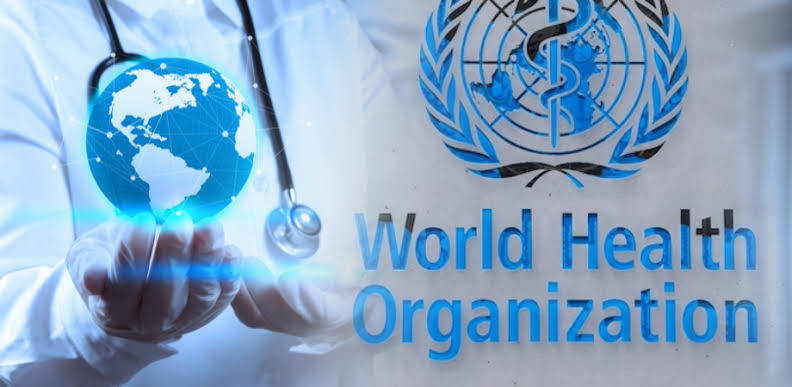Health
WHO Debuts First-Ever Traditional Medicine Summit

The World Health Organization initiated its inaugural traditional medicine summit on Thursday, focusing on gathering evidence and information to ensure the secure utilization of these treatments.
According to the UN health agency, traditional medicines serve as the primary choice for millions globally.
The discussions in India have convened policymakers and scholars with the goal of fostering political dedication and actions rooted in evidence.
Opening the summit, WHO Director-General Tedros Ghebreyesus emphasized the organization’s efforts in accumulating evidence and data to shape guidelines, standards, and regulations for the secure, cost-efficient, and fair application of traditional medicine.
While traditional medicine has the potential to bridge healthcare accessibility gaps, Tedros cautioned that its value hinges on proper, effective, and most importantly, safe application grounded in the latest scientific insights.
Concurrently, the WHO Traditional Medicine Global Summit is occurring alongside a meeting of G20 health ministers in the city of Gandhinagar, India.
“We need to face a very important real-life fact that traditional medicines are very widely used,” Nobel laureate and Chair of WHO Science Council Harold Varmus told the summit via video link.
“It is important to understand what ingredients are actually in traditional medicines, why they work in some cases… and importantly, we need to understand and identify which traditional medicines don’t work.”
Scheduled to become a recurring event, the summit’s inception follows the establishment of the WHO Global Centre for Traditional Medicine in India’s Gujarat state last year.
Despite being prevalent in certain regions, traditional medicines often encounter substantial criticism.
The UN health agency defines traditional medicine as accumulated knowledge, techniques, and practices employed over time for maintaining health and addressing physical and mental ailments.
However, numerous traditional remedies lack scientific validation, and environmentalists assert that the industry contributes to the illicit trade of endangered animals like tigers, rhinos, and pangolins, imperiling entire species.
Throughout the Covid-19 pandemic, the utilization of homemade remedies surged, including a green herbal concoction rooted in Artemisia, endorsed by Madagascar’s president as a remedy.
Although Artemisia has demonstrated effectiveness against malaria, its application against Covid-19 was met with skepticism from many medical professionals.
China boasts a rich legacy of traditional medicine, yet prominent European medical organizations have previously insisted that it adhere to the same regulatory scrutiny as conventional medical approaches.
John Reeder, WHO’s research head, emphasized that the progression of traditional medicine’s scientific understanding must adhere to the same rigorous benchmarks as other health disciplines, stating this in a release.
Out of WHO’s 194 member states, 170 have acknowledged their engagement with traditional and complementary medicine since 2018.
However, merely 124 of them have indicated the existence of laws or regulations governing the use of herbal medicines. Furthermore, only half of these states have established a national policy concerning such methods and medicines.
The WHO emphasized that while something being “natural” doesn’t inherently denote safety, and historical usage doesn’t guarantee effectiveness, rigorous scientific processes must be employed to provide substantial evidence.
Around 40 percent of currently approved pharmaceutical products are derived from natural sources, as per the WHO.
The organization cited notable medications, like aspirin, which originated from traditional medicine practices involving willow tree bark formulations.
Health
25 Health Benefits Of Bitter Leaf
Bitter leaf, also known as Vernonia amygdalina, has many health benefits.
It is being used in Africa and Asia for a long time to treat sickness.
Though it tastes bitter, that’s what makes it good for you. You can consume bitter leaf in different forms like juice or extract.
Studies have found that bitter leaf has good things like alkaloids and flavonoids. These can help with things like fighting inflammation, stopping bacteria, and even fighting cancer. People have used it for a long time to help with stomach problems, fevers, and liver issues.
In Africa, people often use bitter leaf in their traditional medicine, calling it “ewuro.” Tests have shown it really does have medicinal value. It’s becoming more popular worldwide. Bitter leaf also has antioxidants that protect your body from damage and help fight diseases.
One big benefit is that it helps with inflammation, which can cause many health problems. Bitter leaf has a compound called vernodalin that fights inflammation. It’s also good at fighting infections caused by bacteria and viruses.
Here are 25 health benefits of bitter leaf, and bitter leaf juice along with the constituents that provide each benefit:
1. Boosts Immune System: Bitter leaf is rich in antioxidants and other nutrients such as vitamin C and E which help to boost the immune system and protect the body from infections.
2. Helps With Weight Loss: Bitter leaf contains flavonoids that can help to stimulate the breakdown of fat, which makes it a great addition to a weight loss regimen.
3. Reduces Inflammation: The anti-inflammatory properties of bitter leaf can help to reduce inflammation in the body and relieve pain caused by conditions such as arthritis.
4. Treats Malaria: Bitter leaf contains a compound called vernodalin, which has been shown to be effective against the malaria parasite.
5. Regulates Blood Sugar: The antioxidants in bitter leaf can help to regulate blood sugar levels, making it a great natural remedy for people with diabetes.
6. Lowers Blood Pressure: Bitter leaf contains compounds that can help to relax blood vessels and lower blood pressure, making it a great addition to a heart-healthy diet.
7. Improves Digestion: Bitter leaf can help to improve digestion by stimulating the production of digestive enzymes.
8. Treats Skin Infections: Bitter leaf has antimicrobial properties that can help to treat skin infections and prevent the growth of harmful bacteria. This is one of the popular health benefits of bitter leaf.
9. Fights Against Cancer: Bitter leaf contains a compound called vernonolide that has been shown to have anticancer properties.
10. Boosts Liver Health: Bitter leaf can help to protect the liver from damage and improve liver function.
11. Treats Respiratory Infections: Bitter leaf has been used for centuries to treat respiratory infections such as bronchitis and pneumonia.
12. Treats Fever: Bitter leaf has antipyretic properties, which means it can help to reduce fever. This is one of the essential health benefits of bitter leaf.
13. Reduces Anxiety: Bitter leaf has a calming effect on the body and can help to reduce anxiety and stress.
14. Improves Cognitive Function: Bitter leaf contains antioxidants that can help to protect the brain from damage and improve cognitive function.
15. Promotes Wound Healing: The antimicrobial properties of bitter leaf can help to promote wound healing and prevent infection.
16. Treats Sore Throat: Bitter leaf can help to soothe a sore throat and relieve coughing.
17. Fights Against Fungal Infections: Bitter leaf has antifungal properties that can help to treat fungal infections such as ringworm.
18. Boosts Fertility: Bitter leaf has been used for centuries to improve fertility in both men and women.
19. Treats Stomach Ulcers: Bitter leaf has been shown to be effective in treating stomach ulcers.
20. Lowers Cholesterol: Bitter leaf can help to lower cholesterol levels and reduce the risk of heart disease.
21. Promotes Healthy Eyes: Bitter leaf contains antioxidants that can help to protect the eyes from damage and improve vision.
22. Treats Urinary Tract Infections: Bitter leaf has been used to treat urinary tract infections for centuries.
23. Reduces Menstrual Pain: Bitter leaf can help to reduce menstrual pain and regulate menstrual cycles.
24. Treats Insomnia: Bitter leaf can help to promote relaxation and treat insomnia.
25. Improves Skin Health: Bitter leaf contains vitamins and minerals that can help to improve skin health and reduce the appearance of fine lines and wrinkles.
Bitter leaf has many good things for your health. It has different helpful stuff like alkaloids, flavonoids, terpenes, and phenolic acids. These are what make bitter leaf good for you. Bitter melon leaf, bitter gourd leaf, ampalaya leaf, and vernonia amygdalina leaf all have benefits.
Bitter leaf can also help control blood sugar, which is great for people with diabetes. It also fights inflammation, fungus, and bacteria, which can keep you from getting sick.
Health
More Women Living With HIV In Nigeria – NACA
The National Agency for the Control of AIDS (NACA) has highlighted a worrisome trend in Nigeria, with Director General Dr Gambo Aliyu underscoring that more women than men are living with HIV in the country.
Dr Aliyu revealed that young Nigerian women were particularly vulnerable, being three times more likely to live with HIV compared to men in the same age bracket.
He categorically stated that six out of every ten individuals living with HIV in Nigeria were females.
In a press statement released on Tuesday to mark the upcoming International Women’s Day, Dr Aliyu emphasised the importance of empowering Nigerian women. He noted that this year’s theme, ‘Invest in Women: Accelerate Progress,’ aligns with NACA’s commitment to advancing gender equality and addressing the unique challenges faced by women living with HIV/AIDS.
Dr Aliyu stressed that investing in women is not just a financial commitment but also a catalyst for sustainable progress in society. By empowering women, he explained, positive transformations can occur within families, communities, and the nation as a whole.
In light of the International Women’s Day, NACA reaffirmed its dedication to empowering women and girls in the fight against HIV/AIDS. Dr Aliyu highlighted the agency’s ongoing efforts to promote inclusive policies, ensure access to comprehensive healthcare, and provide education to empower women to make informed decisions about their sexual and reproductive health.
Dr Aliyu expressed gratitude to individuals, organisations, and partners contributing to the advancement of women’s rights and the global HIV/AIDS response. He urged continued collaboration towards a future where every woman can live free from the burden of HIV/AIDS.
According to NACA, an estimated 1.8 million people are living with HIV in Nigeria, with approximately 1.63 million already receiving Antiretroviral Therapy, a life-saving medication.
Health
Bello Grants 100% Hazard Allowance To Kogi Health Workers

Kogi State Governor, Yahaya Bello, has taken a significant step by approving a 100% hazard allowance for medical doctors and healthcare professionals in the state.
The decision, aimed at boosting their morale, was disclosed during a courtesy visit by pioneer medical students from Prince Abubakar Audu University, Anyigba, and the Nigerian Medical Association (NMA) leadership at the Government House in Lokoja on Wednesday.
Recall that Governor Yahaya Bello’s administration inherited accreditation challenges for the pioneer set of medical students from the previous government.
In response, the governor placed these affected students on scholarship at various tertiary institutions nationwide, ensuring they could pursue their Bachelor of Medicine and Bachelor of Surgery (MBBS) degrees without hindrance.
Accompanied by their parents and the Abubakar Audu University’s management, including Vice Chancellor Prof. Marietu Ohunene-Tenuche, the students who completed their MBBS extended gratitude during the courtesy visit.
Prof. Ohunene-Tenuche specifically thanked Governor Yahaya Bello for his crucial financial support towards their education and acknowledged his significant investments in the state’s education sector.
Dr. Olusola Baoku, Chairman of the NMA, Kogi chapter, commended Governor Bello for significant advancements in the state’s health sector.
He praised Kogi as one of the seven states in the federation addressing hazard allowances, with a 50% payment for medical doctors.
Dr. Baoku also applauded the Bello administration for enhancing medical infrastructure, stating, “It’s clear now that Kogi is ready to establish and run a medical college.”
In response, Governor Bello affirmed his dedication to advancing healthcare, expressing a commitment to utilizing the state’s resources and policies for the training of medical professionals both within and outside Kogi State.
He clarified that this initiative aimed to address the manpower gap resulting from the “Japa Syndrome” prevalent in the country.
Governor Bello reiterated his administration’s commitment to fostering a conducive working environment for professionals within the state.
He further declared that the 100% hazard allowance for medical doctors and health workers in Kogi State would be implemented immediately.
Accompanied by governor-elect Usman Ododo, Bello assured ongoing enhancements across all economic sectors in Kogi, emphasizing a focus on improving healthcare delivery.



















